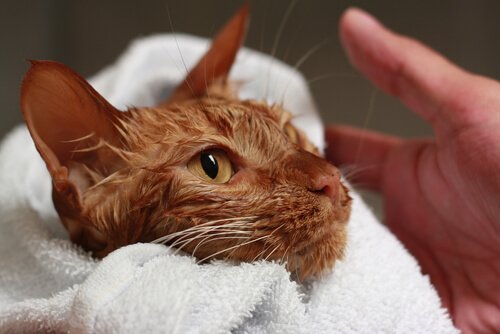How Long Do Cats Live?

The lifespan of a pet depends on many factors. One of them is the care they receive throughout their life. On average, animals that live at home have a 12-year life expectancy (there are many exceptions, of course). In the following article, you can find the answer to the question of how long do cats live?
A cat’s life
In order to get your best friend to have longer and better life, you must follow a control and care plan. Domestic cats (as well as dogs) age faster than humans. Therefore, it is known that one human year is equivalent to 7 feline years. In actuality this isn’t true but it be helpful to understand a cat’s life cycle.

Experts agree that aging happens faster during their first two years. Therefore, the changes that take place in cats during the first 24 months of life happen at a higher rate than those of following years.
Generally, cats live longer than dogs. Despite of this, everything depends on the care, food, breed, if the cat was a stray, if it was vaccinated, etc. A street cat has a life expectancy of about 6 years, but a house cat can reach up to 12 years of age. There are even cases of cats living up to 20 years.
An animal’s life expectancy depends on the care it receives. However, a cats’ curious personality makes them vulnerable to being exposed to many dangers. Therefore, just by keeping a close eye on them and establishing some limits can help your cat avoid fatal accidents.
Factors that influence the lifespan of the cat
There are many dangers in a cat’s life, even if the animal goes outside or remains indoors all day long. The following are factors that can influence the lifespan of your cat:
1. Accidents
A domestic cat is less exposed to cars or larger animals than a stray cat. During your cat’s first “journey”, he may get in an accident — anything from being run over, to running into a trap, or even being attacked by a dog.
2. Disease
The possibility of contracting a disease increases as long the cat has contact with the outside world. When your male cat prowls the neighborhood in search of a female cat in heat, he could be exposed to fights between males, and get wound infected by viruses and bacteria.
3. Obesity
Obesity can also reduce your cat’s lifespan. The felines that don’t go outside often and have very little physical activity gain weight considerably. In regard to humans, obesity causes many medical conditions such as heart attacks, blocked arteries, water retention, etc.
4. Lack of veterinary attention
Many pet owners don’t have their pets get an annual veterinary check-up. When an owner uses the excuse that their cat “looks healthy” instead of having the cat receive medical attention will reduce the cast’s quality of life or lifespan. Some diseases have no visible symptoms and once they are detected, it may be too late.
How to extend a cat’s life?

Although we want our pets to live forever, cats have a lifespan that ranges between 12 and 15 years. To increase their life span (there are several cases of cat living up to 21 years, which involve paying close attention to your cat’s care.
First, make sure the cat has good hygiene and the animal is healthy. Feed your cat according to his needs, put clean water in his drinking bowl every day, deworm him periodically, have a complete vaccination plan and eliminate fleas — all of these actions are part of a cat’s basic care plan.
On the other hand, neutering your pet has many advantages for the animals, since it prevents the transmission of sexual diseases and also the spread of viruses when males fight. A spayed female cat is less likely to have uterine tumors. In males, neutering avoids urethral problems.
Source of the main image: The Collector of Instant Photography & Video
This text is provided for informational purposes only and does not replace consultation with a professional. If in doubt, consult your specialist.